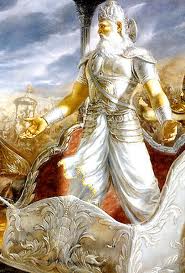No products in the cart.
The decentralized and tolerant religion, Hinduism has also the characteristics of a personalized religion. In a religious context, any act of immorality that violates the harmonious relationship with God is deemed a ‘Sin’. Interestingly, the abstraction of ‘Sin’ in Hinduism does not propound sin as a crime against God, but as an immoral act against dharma i.e., moral order – and one’s own self. The concept of Sin entails Kharma. More often than not, it is thought natural, though unfortunate, that many young minds are condemned for their amoral and immoral behaviors. These behaviors surface due to the notion of living in nescience, i.e., in the darkness of ignorance. Sin is an immoral course of action which is bound to bring negative consequences. The term ‘Sin’ has a double connotation. Its Sanskrit equivalents signify and deem ‘Sin’ a wrongful act. In addition, Sin is associated with the negative consequences resulting from a wrongful act. In Sanskrit, a wrongful act is known by several terms, including Pataka, Papa, etc. Many a time, it is act of violating and doing away with God’s will.
Concept of Five Great Sins in Hinduism:
Wise living consists perhaps less in acquiring good habits than in acquiring as few habits as possible. To all intents and purposes, there is a concept of ‘Five Great Sins’ or in particular, the notion of “Pancha Maha Patakas.” The five great sins in Hinduism are:
- Killing a Brahmin
- Stealing Gold
- Drinking intoxicants
- Sexual Relationship with the teachers wife
- To call one’s own those people who committed such sins as mentioned above and who haven’t corrected their ways and have associated themselves with them for more than a year

There is a noteworthy account of many sins, but these five are mentioned in the scriptures as the unpardonable of all the sins. In addition, legend says that sins can be expiated by making sacrifices. Other sacred practices such as whole-heartedly chanting a mantra or a religious hymn for a fixed number of times, practicing penance, solemn fasting, altruism, philanthropy etc. However, scriptures lay emphasis on the point that these five sins shall never leave the guilty but shall follow him/her till death. Expiations for these are given by a great Saint called Leela Suka:
1. Those who acquaint themselves with the virtuous principles of Lord Rama, and incorporate those principles with unflinching determination may be expiated from the first sin.
2. To make amends for the second sin, one must master the principles and teachings of Lord Krishna, and incorporate them both in letter and spirit, policy and execution.
3. To make amends for the third sin, one must master the principles and teachings of Mahabharata and Bhagavad Gita.
4. To make amends for the fourth sin, one must master the principles of Vishnu Puran and Shiva Puran.
5. There is no expiation for the fifth sin.
Those people who repent and vow never to repeat such actions are only pardoned. Profoundly, it does not mean that one can go on repeating sins and perform expiatory rites. In other places, other heinous sins such as the following are mentioned:
- Stealing a drink of wine
- Killing an unborn child
- Killing a cow or
- Killing a woman or
- Killing a Brahmin or
- Killing oneself (suicide)
- Criticizing a devotee of god
Concept of Sin from Mahabharata:
 Yudhishthira, the eldest son of King Pandu and Queen Kunti said: I desire, O great luminary of Bharata’s race, to hear in detail the source from which sin proceeds and the foundation upon which it rests.
Yudhishthira, the eldest son of King Pandu and Queen Kunti said: I desire, O great luminary of Bharata’s race, to hear in detail the source from which sin proceeds and the foundation upon which it rests.
Upon his request, Bhishma astutely replied: Hear, O King, about the foundation of sin. Covetousness alone is a great destroyer of merit and goodness. From covetousness proceeds sin. It is from this source that sin and irreligiousness flow together with great misery. This covetousness is the spring of all the cunning thoughts, wicked deeds and hypocrisy in the world. It is this covetousness that makes men commit sin. From covetousness proceeds wrath; from covetousness surfaces lust, and it is from covetousness that loss of judgment, deception, pride, arrogance, and malice, as also vindictiveness, loss of prosperity, loss of virtue, excess anxiety, and infamy spring.
Concept of Sin and Virtue in Modern World:
In a world where discipline is of paramount importance, everyone has a different scale to measure sins. We all have different moral codes of conduct, and thus, different levels of etiquette and tolerance. Hence, it becomes clear that a unique scale to measure sins is a distant dream. This question needs to be answered by the epics and religious scriptures. Both center on the depth and consequence of sin. And although similar sins are committed, different outcomes occur. How can similar sins be treated differently when judged by the same theological code? In order to answer these questions, and more, one needs to delve deep into the themes of virtues and moral code of conduct. Epics and scriptures encompass a blend of similar and different elements, and each scripture is an embodiment of an indispensable moral that should be embraced with grace.
Three main concepts are shared by most of the sacred texts, the first of which is sin. Sin is the cornerstone on which most of the works were built upon. The characters with the greatest valor usually committed the greatest offenses. And while lust is the most obvious trait responsible for the downfall of Ravana, it is not the only shared transgression. Witch craft, obsession, and revenge are also evident. Although related sins were committed, they took different tolls, both spiritually and physically.
Concept of Sin with respect to ‘Axioms and Dogma’:
What distinguishes humans from other living creatures is the faculty of speech. And what distinguishes more advanced brothers from their less advanced brothers is the ethical code of conduct. The axioms and the dogma transform questions of vice and virtue. In the era of the modern society, each and every individual is bound to assume personal responsibility for his/her own moral actions and decisions. The seemingly unlimited flexibility and propensity for adaptability make the inescapable notion of ‘Sin’ clear. The role of the Society will experience a paradigm shift. It shall be able to decide questions of individual morality. Its task will be to consider whether or not it should, as a body, accept or reject justifications of a particular moral decision, or pattern of behavior, as advocated by its proponents. The result may be a proposition on the subject where the judiciary, and whole Society concurs, that a particular action/actions is/are necessary for the better preservation of the conditions of the dogma and the pursuit of its aim.
Membership of the idealistic society shall impose a harsh and unrewarding self-discipline in these matters. Pursuant to the complete establishment of the idealistic society, and the creation of formal structures to aid in these decisions, that burden will be onerous. Every individual adherent of this society in each generation will be left with the task of choosing certain standards of conduct they are to adopt, and of justifying that choice. They will also be called upon to judge the present conduct of their fellows against the criteria of the maintenance of the Conditions of the Dogma and the achievement of the Aim of the Society in the uncertain world of the Axioms. As is repeatedly emphasized, the Axioms and Dogma are no panacea for the social and moral problems of humanity. They only provide a base on which we can build a new meaning and purpose for our existence.
Despite all the complexities and uncertainties, vice can be distinguished from virtue by an application of the Axioms, Dogma and Principles. The fundamental method used is one familiar in earlier ideologies. It is to identify the purpose and motivation of any action or decision, and then to judge what its effect is likely to be. Neither an acceptance of the Axioms nor the choice of the Dogma, nor even the emergence of the Society of Human Kind will remove good and evil from the world. The meaning of those words will change, but humanity will still need to find ways to make the distinction.
Wisdom in words and hero in deeds! This is the description of a utopian society in a nutshell. While in many religions the concept of ‘sin’ transcends over our heads, it leads to discontent among few small minded bigots. In a hornet’s nest of complexities and intricacies, Sin is indeed a fascinating topic with several conundrums to be solved!






